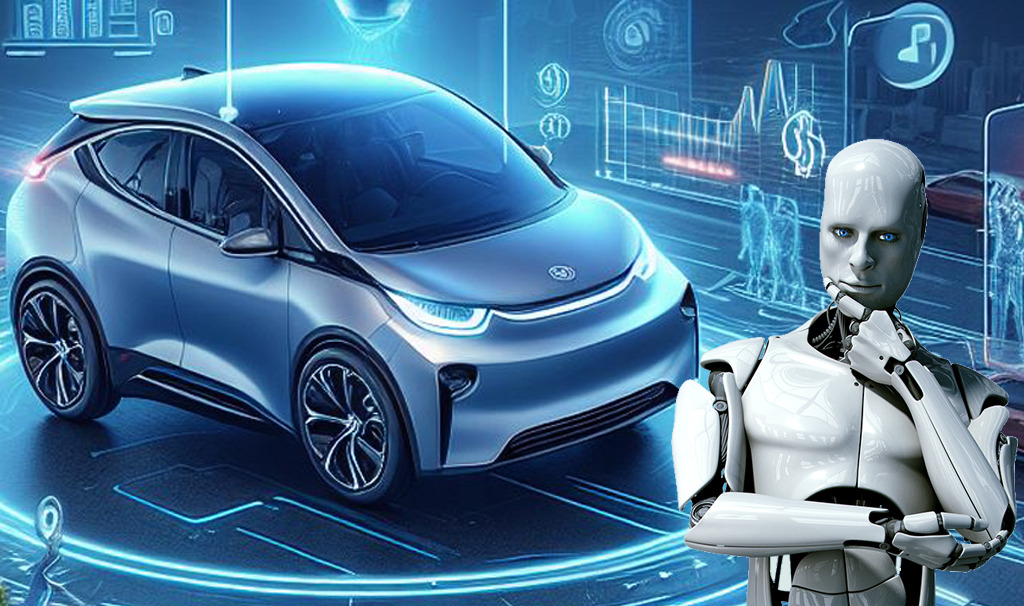In the dynamic world of automotive digital advertising, maintaining a competitive edge necessitates both innovative and strategic approaches. Artificial Intelligence (AI) has recently surfaced as a potent instrument for marketers, radically altering the methods by which digital advertising campaigns are designed, implemented, and fine-tuned. This article delves into the transformative influence of AI on automotive digital advertising and its potential to substantially boost marketing outcomes.
The digital advertising landscape in the automotive industry is fast-paced and ever-evolving. To stay ahead, marketers need to constantly innovate and strategize. In this context, AI has emerged as a game-changer. It has revolutionized the way digital advertising campaigns are planned, executed, and optimized, leading to more effective marketing strategies and improved results.
AI’s impact on automotive digital advertising is transformative. It allows marketers to leverage data-driven insights to create more targeted and personalized campaigns. AI algorithms can analyze vast amounts of data to identify patterns and trends, enabling marketers to understand customer behavior and preferences better. This understanding allows for the creation of more relevant and engaging ads, leading to improved click-through rates and conversions.
Moreover, AI can automate many aspects of digital advertising. From ad creation to campaign management and performance tracking, AI can handle these tasks more efficiently and accurately than humans. This automation frees up marketers’ time, allowing them to focus on more strategic aspects of their work.
AI also enhances the optimization of digital advertising campaigns. It can continuously monitor campaign performance and make real-time adjustments to maximize results. This ability to quickly adapt to changing circumstances is crucial in the fast-paced world of digital advertising.
1. Customized Advertising through AI:
Incorporating AI into automotive digital advertising offers the significant benefit of enabling highly customized and targeted ads. AI algorithms sift through large volumes of data, including user behavior, preferences, and online interactions, to formulate intricate customer profiles. This allows marketers to adjust their ad content to individual characteristics, ensuring each consumer receives messages that echo their specific interests.
For instance, AI can detect users who have expressed interest in electric vehicles and present them with targeted ads that highlight the newest electric models or incentives. This degree of customization not only boosts ad relevance but also increases the chances of conversion, as consumers are more inclined to interact with content that matches their preferences.

- Evolving Advertisements and Optimization:
Artificial Intelligence (AI) is a potent tool for automotive marketers, facilitating the creation of dynamic and adaptive advertisements. These ads are designed to respond instantly to shifts in consumer behavior and market trends. This adaptability is achieved by harnessing machine learning algorithms, which empower advertisers to automatically alter various ad components such as headlines, images, and calls-to-action, based on performance indicators.
For instance, if it is observed that certain images or messages are more effective in driving clicks or conversions, AI can dynamically optimize the ad content to emphasize these elements. This dynamic optimization ensures that your digital ads are continually updated and fine-tuned to align with what your target audience finds most engaging. This continual refinement maximizes the impact of your campaigns, ensuring that your advertising efforts yield the best possible results. This innovative approach to ad creation and optimization highlights the transformative potential of AI in enhancing marketing strategies and outcomes.

3. Predictive Analytics for Campaign Success:
Predictive analytics, powered by Artificial Intelligence (AI), is a game-changer for campaign success. It forecasts outcomes and refines strategies by analyzing past campaign data and discerning patterns. This enables AI to predict the success rate of various ad strategies and suggest the most effective ones for specific objectives.
This predictive ability is a boon for automotive marketers. It allows for efficient budget allocation, focusing on channels that perform well, and optimizing ad placements for the greatest impact. The goals may vary – from enhancing brand visibility, driving traffic to the website, or increasing conversions. Regardless, AI-driven predictive analytics offer crucial insights that aid in strategic decision-making. This not only optimizes marketing efforts but also paves the way for successful campaigns. In essence, AI is revolutionizing the way marketers strategize, leading to more successful and impactful campaigns.
Consider “AutoFusion”, an automotive company. They use various marketing channels but struggle with their effectiveness and budget allocation. AI-driven predictive analytics can help. By analyzing past campaign data, AI can predict the success of different ad strategies. For example, it might find that social media campaigns yield a higher return on investment than TV ads, suggesting a reallocation of funds. Furthermore, AI can optimize ad placements, predicting which ads will perform best on which platforms and at what times. This allows AutoFusion to make informed decisions, optimize their marketing efforts, and increase their campaign success rate. This exemplifies the power and practical application of predictive analytics.

4. Chatbots and Customer Engagement:
In the automotive industry, AI-powered chatbots are transforming customer engagement. These intelligent systems, when integrated into digital advertising platforms, offer a smooth and interactive user experience. They are capable of responding to inquiries, providing product details, and even aiding in the car purchasing process, making them a valuable asset for automotive businesses.
The immediate and personalized interaction offered by these chatbots enhances customer satisfaction and increases the chances of successful conversions. They can provide real-time assistance, answer specific questions about a vehicle’s features or pricing, and guide the customer through the buying process, contributing to a more positive customer journey.
Imagine a potential customer exploring a digital ad and having specific questions about a vehicle. The AI-powered chatbot can interact with this user in real-time, providing the information they are looking for and guiding them through the next steps of the car-buying process. This level of interaction not only addresses the customer’s queries but also enhances their overall experience, making them more likely to convert.
To sum up, AI-powered chatbots in automotive digital advertising channels are improving customer engagement by offering instant, personalized interactions. This not only elevates the customer’s experience and satisfaction but also boosts the chances of successful conversions, making chatbots an essential tool in the automotive industry.

- Enhancing Cross-Channel Marketing with AI:
Artificial Intelligence (AI) is revolutionizing cross-channel marketing by consolidating data from diverse digital advertising platforms. This integrated approach provides marketers with a holistic view of customer interactions across various channels, thereby facilitating more efficient campaign coordination and synchronization.
AI’s ability to amalgamate data from platforms like social media, search engine marketing, display advertising, and others, allows it to pinpoint synergies and opportunities for a more unified and potent advertising strategy. This ensures that your promotional message is delivered to the appropriate audience at the optimal time, across numerous channels, thereby amplifying the overall impact of your digital advertising initiatives. This method not only enhances the reach of your campaigns but also optimizes the return on your advertising investment.
In essence, AI-driven cross-channel marketing optimization goes beyond individual channel insights. It creates a unified and dynamic strategy where data from one channel informs and enhances strategies across others. This interconnected approach ensures that marketing efforts are not siloed, resulting in a more cohesive, impactful, and personalized experience for the target audience across multiple digital touchpoints.
Example, In an electric vehicle launch campaign, AI analyzes social media engagement to inform SEM, display ads, and email marketing. Insights guide SEM keyword selection and ad copy, optimize display ad visuals, and tailor email content. AI tracks the customer journey, revealing touchpoints and attributing conversions to specific channels. This integrated approach ensures a cohesive, impactful, and personalized campaign across multiple digital touchpoints, maximizing the effectiveness of each channel in driving awareness and conversions for the new electric vehicle model.

In conclusion, embracing AI in automotive digital advertising opens up a realm of possibilities for marketers seeking to boost their results in a competitive landscape. From personalized ad targeting and dynamic creatives to predictive analytics, chatbots, and cross-channel optimization, the integration of AI-driven technologies enhances every facet of the digital advertising journey. As the automotive industry continues to evolve, harnessing the power of AI is not just a competitive advantage but a strategic imperative for those aiming to thrive in the digital marketing arena.
The Top 5 Benefits of AI for Automotive Marketers
In the rapidly evolving landscape of the automotive industry, the introduction of Artificial Intelligence (AI) has heralded a paradigm shift, particularly in the realm of marketing. As technology progresses at an unprecedented rate, automotive marketers are increasingly harnessing the power of AI to refine their strategies and maintain a competitive edge in an ever-changing market environment. This article provides a comprehensive exploration of the top five advantages of integrating AI into automotive marketing, delving into the nuances of each benefit and its implications for industry professionals.
- Enhanced Customer Engagement
AI serves as a catalyst for transforming customer engagement in the automotive sector. By leveraging sophisticated algorithms to analyze vast troves of customer data, marketers can gain invaluable insights into individual preferences, behaviors, and purchase patterns. Armed with this granular understanding, automotive marketers can craft highly personalized marketing strategies that resonate with target audiences on a profound level. From personalized email campaigns to tailored product recommendations, AI-powered solutions enable marketers to forge deeper connections with customers, fostering brand loyalty and driving long-term engagement.
Furthermore, AI facilitates dynamic content creation and delivery, enabling marketers to deploy relevant and timely messages across various digital touchpoints. Whether through interactive chatbots or personalized social media interactions, AI-driven customer engagement strategies enable automotive brands to deliver compelling experiences that captivate and retain customers in an increasingly competitive marketplace.
- Improved Decision Making
In the era of big data, the ability to derive actionable insights from vast datasets is paramount for informed decision making. Herein lies the transformative potential of AI in automotive marketing. By employing advanced machine learning algorithms, marketers can harness the power of AI to process and analyze massive volumes of data with unparalleled speed and accuracy.
This capability empowers marketers to make data-driven decisions across every facet of the marketing spectrum, from product development and pricing strategies to campaign optimization and customer segmentation. By leveraging AI-driven predictive analytics, automotive marketers can forecast market trends, anticipate consumer preferences, and identify emerging opportunities with a level of precision that was previously unattainable.
Moreover, AI facilitates real-time monitoring and analysis of marketing performance metrics, enabling marketers to adapt and optimize their strategies on the fly. Whether adjusting advertising spend based on campaign performance or fine-tuning messaging to resonate with specific audience segments, AI empowers automotive marketers to navigate the complexities of the modern marketplace with confidence and agility.
- Efficient Advertising
Effective advertising lies at the heart of automotive marketing success, and AI is revolutionizing the way marketers conceptualize and execute their advertising strategies. By harnessing the power of AI-driven analytics, marketers can gain deeper insights into consumer behavior and preferences, allowing for the creation of highly targeted and relevant advertising campaigns.
AI-powered advertising platforms leverage machine learning algorithms to analyze vast datasets, identify patterns, and optimize ad targeting in real-time. Whether through programmatic advertising or personalized retargeting campaigns, AI enables automotive marketers to deliver hyper-targeted messages that resonate with audiences across various digital channels.
Furthermore, AI facilitates dynamic ad creative optimization, allowing marketers to A/B test different ad variations and automatically allocate budget to the highest-performing creatives. This iterative approach to advertising optimization ensures maximum impact and ROI, driving tangible results for automotive brands in an increasingly competitive advertising landscape.
- Predictive Analytics
Predictive analytics represents a cornerstone of AI-driven marketing in the automotive industry, offering unparalleled insights into future market trends and consumer behavior. By analyzing historical data and identifying predictive patterns, AI algorithms can forecast sales trends, anticipate demand fluctuations, and inform strategic decision making.
For automotive marketers, predictive analytics powered by AI holds immense potential across various domains, from inventory management and production planning to pricing optimization and sales forecasting. By leveraging predictive models, marketers can proactively adjust their strategies to capitalize on emerging opportunities and mitigate potential risks, ensuring a competitive advantage in a rapidly evolving marketplace.
Moreover, AI-driven predictive analytics enable automotive brands to anticipate customer needs and preferences, facilitating the development of targeted product offerings and marketing campaigns. By aligning their strategies with predictive insights, marketers can deliver compelling value propositions that resonate with consumers, driving brand preference and fostering long-term loyalty.
- Automation of Routine Tasks
In the era of automation, AI-driven technologies are revolutionizing the way automotive marketers approach routine tasks and workflows. From email marketing automation to social media management and content creation, AI-powered solutions streamline and optimize various aspects of marketing operations, freeing up valuable time and resources for strategic initiatives.
AI-driven marketing automation platforms leverage machine learning algorithms to automate repetitive tasks, such as lead nurturing, customer segmentation, and campaign scheduling. By automating these routine tasks, marketers can focus their time and energy on high-impact activities, such as strategy development, creative ideation, and performance analysis.
Furthermore, AI-powered content generation tools enable marketers to create compelling and personalized content at scale, leveraging natural language processing (NLP) algorithms to generate blog posts, product descriptions, and social media captions automatically. This automation of content creation not only saves time and resources but also ensures consistency and relevance across various marketing channels, enhancing brand perception and driving engagement.
In conclusion, the integration of AI into automotive marketing offers a myriad of benefits, ranging from enhanced customer engagement and improved decision making to efficient advertising, predictive analytics, and automation of routine tasks. As automotive brands continue to embrace AI-driven technologies, the role of AI in shaping the future of automotive marketing is poised to expand exponentially, driving innovation, efficiency, and effectiveness across the industry.

Jay Narayan Maurya
Meet Jay Narayan Maurya, a Google Certified Digital Marketer with over 15+ years of experience. Renowned as a digital marketing trainer, AI expert, web and graphics designer, video editor, and SEO specialist, Jay boasts a dedicated following of 20,000+ at LinkedIn. Beyond his freelancing success, Jay is an author of “Redefining digital marketing with artificial intelligence” . With a unique blend of skills and a passion for innovation, he stands at the forefront of the industry. Join Jay on a transformative journey as he shares insights, techniques, and the latest trends, redefining the landscape of digital marketing for professionals and enthusiasts alike.

